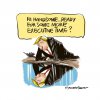What immediately jumps out are the dark gray bars representing Trump’s “executive time,” unstructured time in which the president can call friends and advisers, hold impromptu meetings or watch news programming. This was Axios’s focus in its report, noting that about 60 percent of the time from 8 a.m. to 5 p.m. on the scheduled days is executive time.
There’s a sort of default assumption among Trump’s critics that the president spends most of this time in a semi-stupor, watching Fox and tapping away at Twitter, but that’s probably not the case for much of the time. You’ll notice that, after his initial “executive time” period on most days, there are fewer tweets overlapping with those periods during his day.
Instead, the time seems to serve largely as the sort of freewheeling time to which Trump grew accustomed as the CEO of the Trump Organization. He and his team tend to mush together all of his unstructured time — including obviously nonproductive time watching cable news shows — as being work periods. It’s similar, in some ways, to how the administration will only rarely admit that the president is playing golf. At one point, former press secretary Sean Spicer suggested that Trump was making calls and holding meetings at his golf clubs, not necessarily hitting the links. By incorporating unscheduled call and meeting time in any way with Trump’s preferred leisure activities, those activities get blurred into an argument that the president constantly has his nose to the grindstone.
Looking more closely, though, you’ll notice that there are nearly as many tweets sent during scheduled time as during executive time. Many of these come at the end of those scheduled periods, but some don’t. Some, as on Dec. 7, coming during flights on Air Force One.
The impression we get from Trump’s leaked schedules, really, is that Trump’s day doesn’t really start until 11 a.m. Before that, he seems to be engaged in the sort of “executive time” that his critics disparage: Lots of watching television and tweeting about things that are on his mind. After that initial block, though, his executive time bears fewer of those hallmarks, looking more like the sort of unstructured-but-productive time his advocates suggest make up much of his day.
In a statement to Axios, Sanders responded to its story about Trump’s schedule.
“President Trump has a different leadership style than his predecessors and the results speak for themselves,” she said, in a statement that Trump’s detractors might also offer verbatim.












